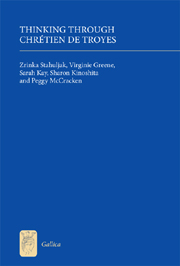Book contents
- Frontmatter
- Contents
- Preface
- Introduction
- 1 The “Changeful Pen”: Paradox, Logical Time, and Poetic Spectrality in the Poems Attributed to Chrétien de Troyes
- 2 Imagination
- 3 Adventures in Wonderland: Between Experience and Knowledge
- 4 Feudal Agency and Female Subjectivity
- 5 Forgetting to Conclude
- Epilogue
- Appendix I Sigla of the Principal Manuscripts of the Chrétien Romances
- Appendix II Lyric Texts, Textual Notes and Translations
- Appendix III Passages from Cligés for Comparison with Lyric Texts
- Appendix IV Variants to the “Cart Scene” in Le Chevalier de la Charrete
- Bibliography
- Index
- Title in the Series
Epilogue
Published online by Cambridge University Press: 05 February 2013
- Frontmatter
- Contents
- Preface
- Introduction
- 1 The “Changeful Pen”: Paradox, Logical Time, and Poetic Spectrality in the Poems Attributed to Chrétien de Troyes
- 2 Imagination
- 3 Adventures in Wonderland: Between Experience and Knowledge
- 4 Feudal Agency and Female Subjectivity
- 5 Forgetting to Conclude
- Epilogue
- Appendix I Sigla of the Principal Manuscripts of the Chrétien Romances
- Appendix II Lyric Texts, Textual Notes and Translations
- Appendix III Passages from Cligés for Comparison with Lyric Texts
- Appendix IV Variants to the “Cart Scene” in Le Chevalier de la Charrete
- Bibliography
- Index
- Title in the Series
Summary
Our project of thinking through Chrétien was inspired by the desire to move away from the critical project of thinking about Chrétien or with Chrétien, as though Chrétien were an author whose identity was securely anchored in specific identifications. We also aspired to escape a rigid chronological frame in which the Chrétien œuvre is defined by the perception of an increasing maturity or progression of ideas. What insights are to be gained, we asked, when the relation of the corpus to the proper name is taken as a convention rather than as a biographical claim that implicitly dictates notions of coherence or of the development of a style? In our exploration of the Chrétien works, we focused not on a style defined by an author (Chrétien de Troyes), but rather on a series of recurring questions and concerns that arise out of an intellectual milieu, an exploration of subjectivity, and an engagement with the liberties and constraints of poetic form. We took the Chrétien works as nodes in a network of poetic and courtly/chivalric ideas. We saw the internal contradictions and heterogeneity of the Chrétien works as inherent and constitutive parts of the corpus that should not be explained away through the appeal to a cohesive authorial persona and style, but that are worth interrogating for what they might suggest about how the texts themselves think.
Thinking through Chrétien has meant embracing the inconsistency and complexity of texts as constitutive qualities of the rich œuvre we associate with Chrétien de Troyes, and exploring the logical, epistemological, rhetorical, historical, and theoretical implications of what might be called an incoherent Chrétien.
- Type
- Chapter
- Information
- Thinking Through Chrétien de Troyes , pp. 163 - 166Publisher: Boydell & BrewerPrint publication year: 2011



